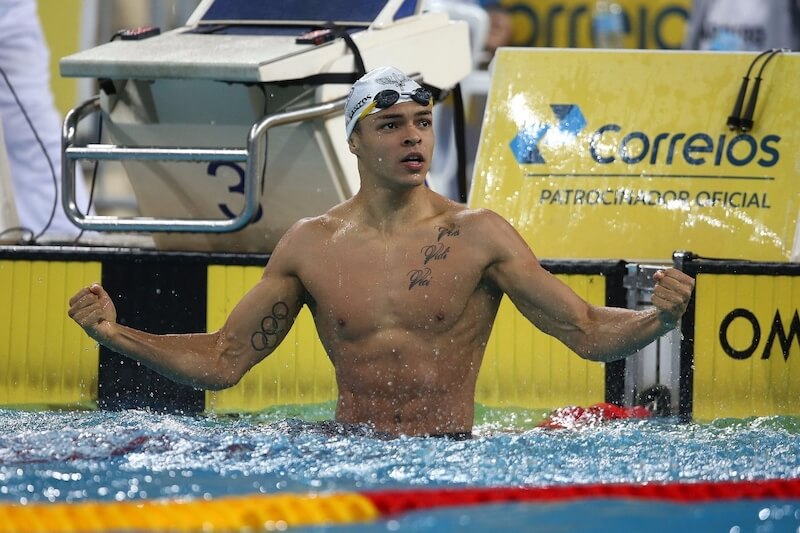Gabriel Da Silva Santos Cleared By CAS, Cross-contamination Blamed For Brazilian Swimmer’s Doping Positive

Gabriel Da Silva Santos, the young Brazilian sprint swimmer, has been given a green light to compete again free of a doping record by the Court of Arbitration for Sport.
Santos was served a suspension by FINA after he tested positive for Clostebol, an exogenous anabolic agent on the World Anti-Doping Agency (WADA) Prohibited Substances List.
Now, the CAS has concluded that he tested positive through no fault of his own, the explanation put down to cross contamination. Santos will now be able to race at Brazilian Championships and trials in search of a berth at the Olympic Games in Tokyo.
Santos was dropped from the International Swimming League as a result of his positive test. He may now be eligible for the League, which has a zero-tolerance Anti-Doping policy.
The case also robbed Santos of racing at the World Championships in Gwangju and the Pan American Games last year.
The case is not the first in Brazil in which decisions came down to cross-contamination: in 2011, CAS convened a special hearing in Shanghai, on the eve of the World Championships, that allowed three swimmers, including Cesar Cielo, back in, while the fourth, Vinicius Waked, received a second penalty.
The CAS statement in full:
Lausanne, 14 February 2020 – The Court of Arbitration for Sport (CAS) has issued its decision in the appeal arbitration procedure between the Brazilian swimmer Gabriel Da Silva Santos and the International Swimming Federation (FINA). The CAS Panel has set aside the decision rendered by the FINA Doping Panel in July 2019 (the Challenged Decision) and replaced it with a new decision in which Gabriel Da Silva Santos is found to have committed an Anti-Doping Rule Violation (ADRV) for which he bears no fault or negligence and for which no period of ineligibility shall be imposed on him.
In May 2019, Gabriel Da Silva Santos underwent an out-of-competition doping control. The sample tested positive for the presence of the prohibited substance Clostebol, an exogenous anabolic agent that appears on the World Anti-Doping Agency (WADA) Prohibited Substances List. Following an investigation, the FINA Doping Panel concluded in the Challenged Decision that while the source of the prohibited substance was cross-contamination through the sharing of bathroom towels and products with a family member who had been using Clostebol under medical prescription, ruled that Gabriel Da Silva Santos had committed an ADRV and sanctioned him with a one-year period of ineligibility as from 20 July 2019.
In his appeal to the CAS, Gabriel Da Silva Santos requested that the Challenged Decision be set aside and that either no period of ineligibility be imposed on him, or in the alternative, the minimum available sanction contained in the rules applicable to the matter. The CAS arbitration was conducted by a CAS Panel composed of Mr Jeffrey G. Benz (USA), President, Mr Efraim Barak (Israel) and Ms Raphaëlle Favre-Schnyder (Switzerland) who held a hearing in the presence of the parties in December 2019 at the CAS headquarters in Lausanne, Switzerland.
It was accepted by the parties that the presence of Clostebol in Gabriel Da Silva Santos’s sample was non-intentional and arose from cross-contamination. The CAS Panel unanimously found that in the circumstances of this case, no fault or negligence should be attributed to the athlete for the ADRV. In view of this finding, the Panel applied Article 10.4 of the FINA Doping Control Rules, which sets out that where a finding of No Fault or Negligence is made, any otherwise applicable period of ineligibility shall be eliminated entirely. Accordingly, the one-year period of ineligibility imposed by the FINA Doping Panel on Gabriel Da Silva Santos has been eliminated and is no longer in force.




Really, a bathroom towel?! Have you not thought the possibility that Da Silva Santos used the towel in purpose, because he had already covered his back by this “explanation”. Pandora’s box is now open. CAS is a joke, nothing than a heavily corrupted organization.